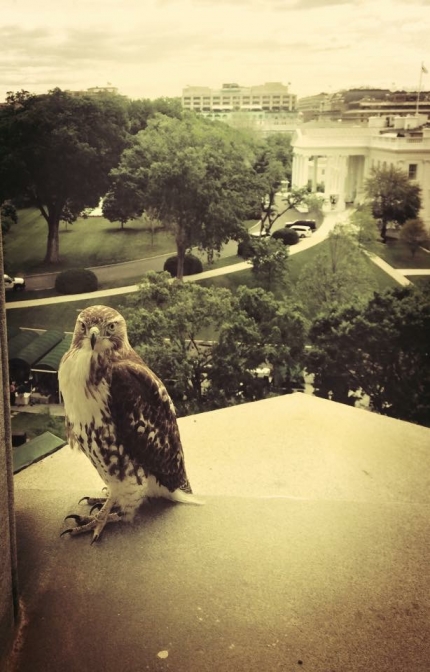The White House Grounds Have a New Feathered Visitor!
If you’re planning on being near the White House sometime soon, use your eagle eye to spy a hawk!
This week, I, along with others at and around the White House have been enjoying the company of what appears to be a young red-tailed hawk that has taken a liking to the White House grounds. Check out the great photo below that U.S. Chief Data Scientist and Deputy Chief Technology Officer DJ Patil was able to snap of our feathered friend:
As an avid recreational bird-watcher, I’m always fascinated to see how birds respond and adapt to their environments. Hawks and other raptors living in urban areas offer a good example of avian adaptation. In their natural habitat, many raptors gravitate toward areas with tall trees or high rock ledges that provide good nesting sites and perches from which to scan the sky and ground for prey. Raptors also gravitate toward areas with abundant populations of small birds, rodents, and other small mammals that are staples in the diets of the majority of raptor species. In urban areas, many raptors adjust by nesting and perching on tall buildings, telephone poles, and other structures instead of trees or rock ledges, and prey on the animals like pigeons, mice, rats, and squirrels that tend to thrive in cities.
But as we admire and appreciate the animals that have learned to live in our backyards, it’s important to remember that it’s becoming increasingly difficult for much of the world’s wildlife to adapt to the changes that humans are imposing on our shared planet. Consider, for example, the effects that climate change is having on birds. Rising average temperatures, more extreme weather events, and sea-level rise are all forcing bird populations out of their natural habitats and ranges. There’s also strong evidence that climate change induces behavioral changes in birds, altering migration and breeding patterns.
As a result, we’re seeing declines in the populations of many bird species, which will only continue unless something changes. One recent study notes that by the year 2080, around half of the bird species in the United States could lose more than 50 percent of their current range due largely to the effects of climate change. If that happens, 10 states might lose all populations of their state birds, including iconic species like the Mountain Bluebird in Idaho and Nevada, the Baltimore Oriole in Maryland, and the Wood Thrush right here in our nation’s capital.
It’s our responsibility to do what we can to tackle climate change and take other actions to help protect and restore declining populations of birds and other animals in the U.S. and worldwide. President Obama’s Administration is leading on this front in a number of ways, including unveiling a comprehensive strategy to promote pollinator health and habitat, to supporting the National Climate Assessment to help us identify and respond to the most pressing effects of climate change, to implementing an ambitious series of executive actions under the Climate Action Plan.
But we can’t do it alone! From maintaining parks and gardens in your community to getting involved with local wildlife protection groups, there are all sorts of ways you can help make the world a better place for birds and other animals…from the White House to the wild.
Tamara Dickinson is Principal Assistant Director for Environment & Energy at the White House Office of Science and Technology Policy.
White House Blogs
- The White House Blog
- Middle Class Task Force
- Council of Economic Advisers
- Council on Environmental Quality
- Council on Women and Girls
- Office of Intergovernmental Affairs
- Office of Management and Budget
- Office of Public Engagement
- Office of Science & Tech Policy
- Office of Urban Affairs
- Open Government
- Faith and Neighborhood Partnerships
- Social Innovation and Civic Participation
- US Trade Representative
- Office National Drug Control Policy
categories
- AIDS Policy
- Alaska
- Blueprint for an America Built to Last
- Budget
- Civil Rights
- Defense
- Disabilities
- Economy
- Education
- Energy and Environment
- Equal Pay
- Ethics
- Faith Based
- Fiscal Responsibility
- Foreign Policy
- Grab Bag
- Health Care
- Homeland Security
- Immigration
- Innovation Fellows
- Inside the White House
- Middle Class Security
- Open Government
- Poverty
- Rural
- Seniors and Social Security
- Service
- Social Innovation
- State of the Union
- Taxes
- Technology
- Urban Policy
- Veterans
- Violence Prevention
- White House Internships
- Women
- Working Families
- Additional Issues


